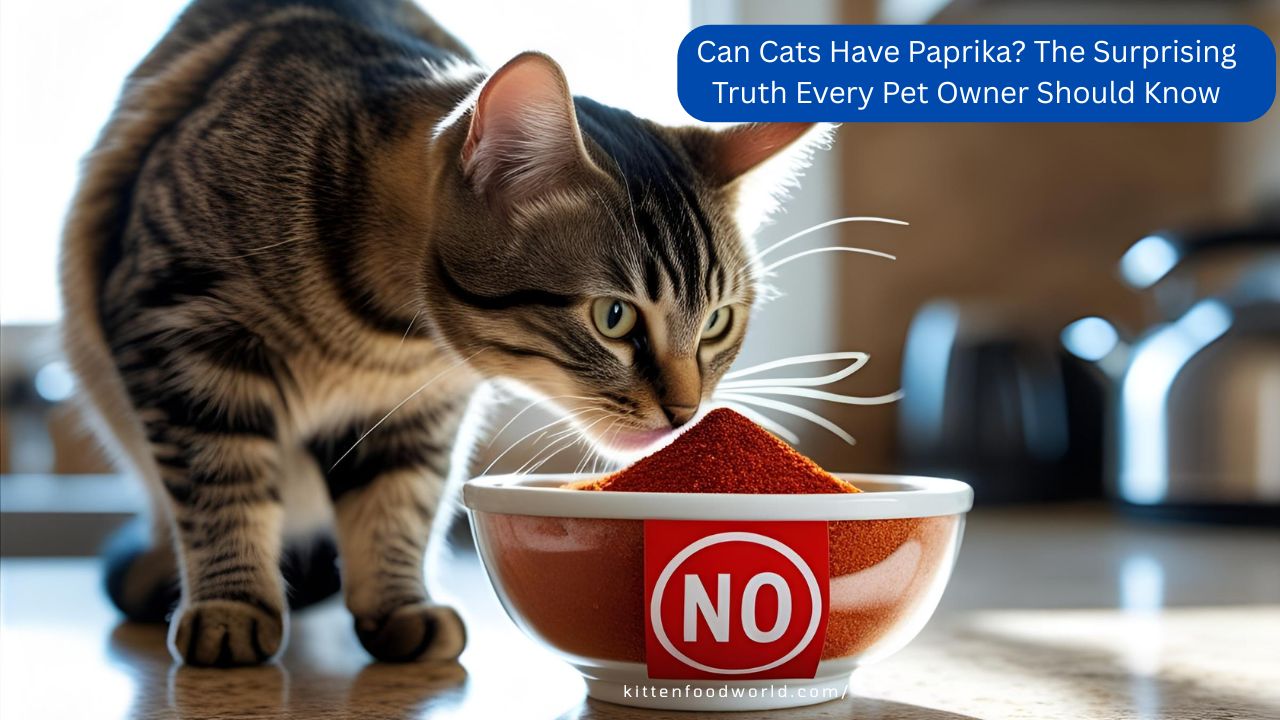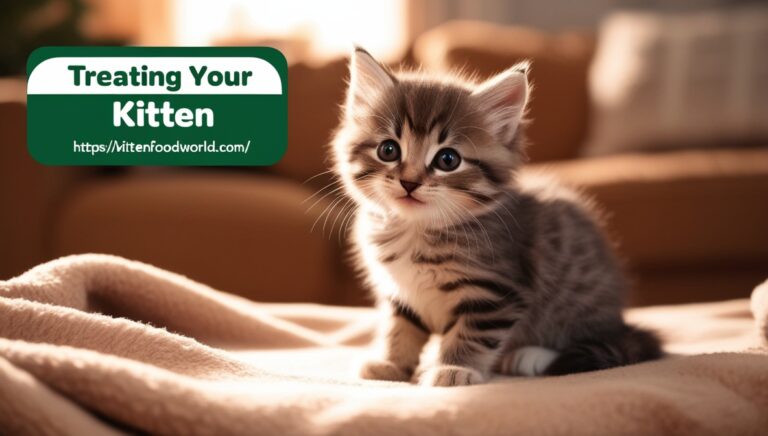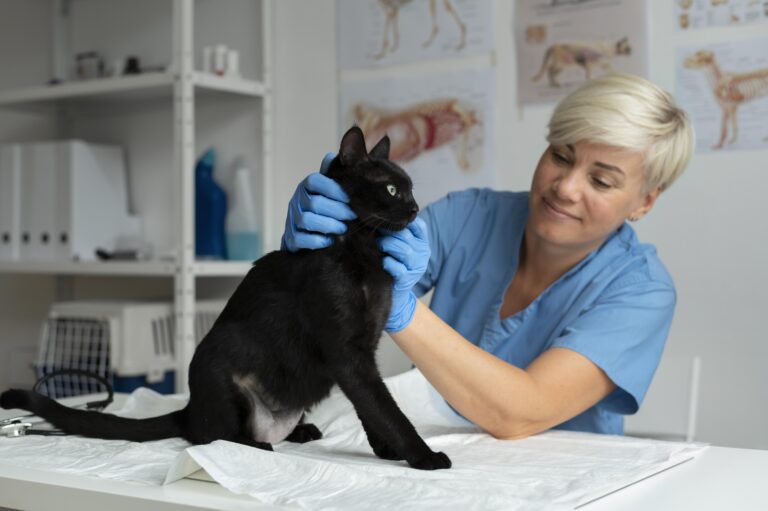Can Cats Have Paprika? The Surprising Truth Every Pet Owner Should Know
Introduction
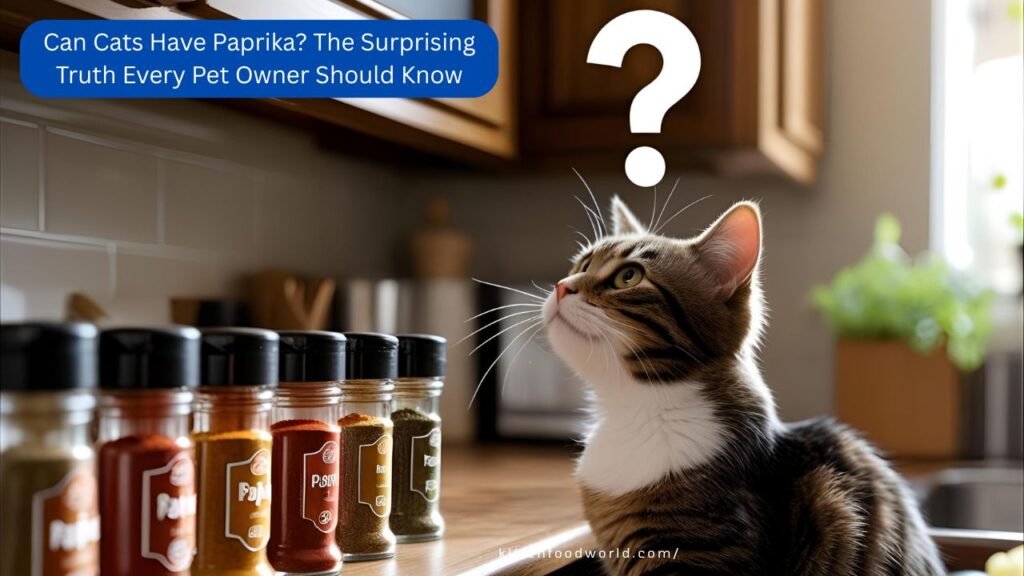
Cats are naturally curious creatures, especially when it comes to what their humans are eating. Whether it’s a bowl of chips or a plate of seasoned chicken, their noses are always ready to explore.
But just because something smells good doesn’t mean it’s safe. One common seasoning people ask about is paprika. Can cats have paprika, or is it harmful to them?
This question matters more than most pet owners might realize. While a pinch of spice might seem harmless, certain ingredients can cause real issues for cats.
Spices like black pepper, chili powder, and garlic are known to irritate a cat’s digestive system, and paprika falls into that risky category too.
The growing trend of sharing snacks with pets — like paprika chips or crisps — has made it even more important to know what’s okay and what isn’t.
Searches like “can cats eat paprika chips,” “can cats have black pepper,” or “can cats have mayo” are becoming more common, showing just how many people are unsure.
Understanding what’s in your food before sharing is the best way to avoid accidental harm. This post answers the question: can cats have paprika, and explains the effects of other common seasonings too.
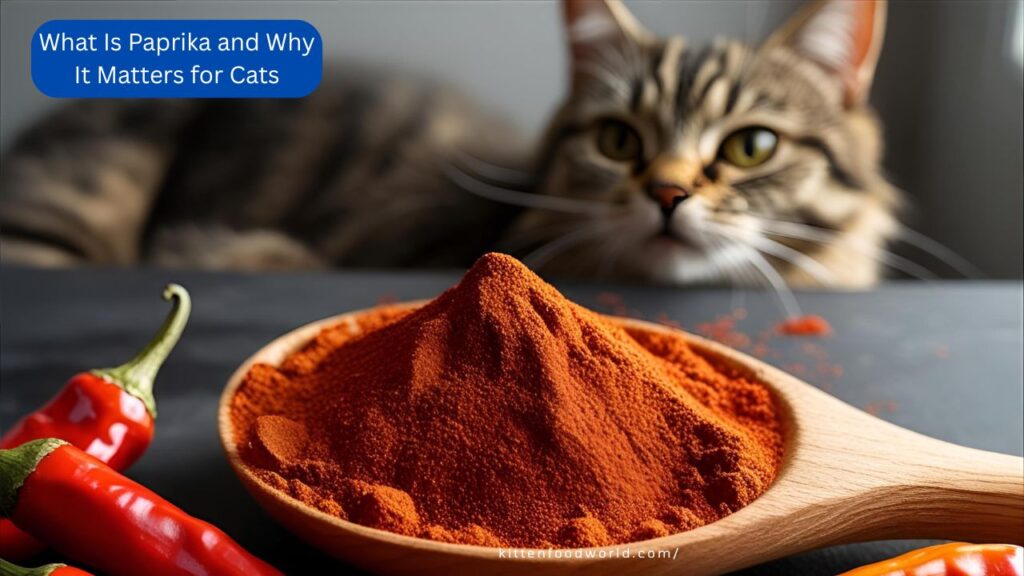
Background Information
Paprika is a common kitchen spice made from dried and ground red peppers, typically bell or chili varieties. It’s widely used to add color, flavor, and mild heat to dishes like soups, meats, and stews.
While harmless to humans in moderation, the question “can cats have paprika” brings up real concerns for pet owners.
There are several types of paprika: sweet, smoked, and hot. Sweet paprika has a mild flavor with little to no heat and is often used in Eastern European recipes.
Smoked paprika is dried over wood fires, giving it a bold smoky flavor. Hot paprika, as the name suggests, contains spicier chili peppers and carries a stronger heat profile.
Each type varies in spice level and chemical compounds, some of which can be irritating to animals.
Cats have a far more delicate digestive system compared to humans. They are obligate carnivores, which means their bodies are designed to process meat, not spices, herbs, or additives.
Even trace amounts of seasonings can lead to gastrointestinal upset, vomiting, or diarrhea.
This is why questions like “can cats eat paprika chips”, “can cats eat paprika crisps”, or “can cats have black pepper” are frequently asked by cautious owners.
Similar concerns arise with “can cats have mayo”, “can cats eat pepper and salt”, and “can cats have chili powder”, as most processed foods and seasonings are not cat-friendly.
When researching “can cats have paprika powder” or browsing forums like “can cats have paprika reddit”, many owners share the same conclusion: keep seasonings away.
Whether it’s parsley, garlic, onion powder, or even spices safe for dogs like paprika, feline diets should stay simple and spice-free.
Detailed Explanation
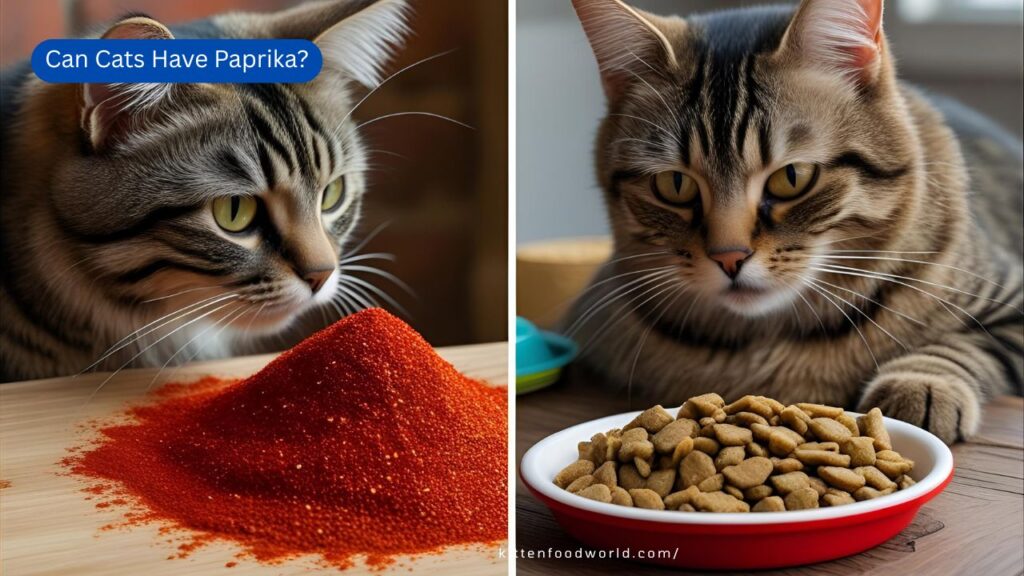
Can cats have paprika?
- Short answer: No, it’s not recommended.
- Why paprika is harmful or risky:
- Contains capsaicin (especially in hot/smoked types), which can irritate a cat’s mouth, stomach, or cause vomiting.
- No nutritional benefit for felines.
- Potential for allergic reactions or toxicity if consumed in large amounts.
Examples: Can Cats Have Paprika?
One evening, a pet owner left a bowl of roasted vegetables sprinkled with paprika on the kitchen counter. While unattended, their curious cat jumped up and licked the remnants.
Within a few hours, the cat showed signs of discomfort—drooling, mild vomiting, and restlessness. A quick vet visit revealed that paprika was the likely irritant.
Though not deadly, the spice caused gastrointestinal upset. This case highlights why pet owners should ask: can cats have paprika safely?
Now consider other kitchen spices. Can cats have garlic or onion powder? Definitely not. Both contain compounds that can damage a cat’s red blood cells, leading to anemia.
Even a small amount of chili powder can irritate a cat’s mouth and stomach. Some might wonder, can cats eat paprika chips or paprika crisps? These snacks are even riskier—packed with salt, artificial flavorings, and preservatives that don’t belong in a feline’s diet.
People also ask, can cats have black pepper or can cats eat pepper and salt? The answer is no. Spicy and salty foods can cause irritation and dehydration in cats.
So what can cats have instead? Safe herbs and treats do exist. For instance, small amounts of parsley may support digestion. But it must be fresh and given occasionally—avoid large doses.
Questions like can cats have parsley, can cats have basil, or even can cats have mayo are common. While mayo isn’t toxic, its high fat content is not suitable for cats and may lead to weight gain or digestive issues.
If you’re looking for something they might enjoy, catnip is a safe, fun alternative. A sprinkle of dried catnip or a catnip toy can provide stimulation without harm.
People often check forums like Can cats have paprika Reddit, but when in doubt, always contact a vet. Whether it’s can dogs have paprika or can cats have paprika powder, avoiding risky spices is the safest route.
A cat’s digestive system is delicate, and their curiosity can sometimes lead to accidental exposure. Keeping spices away is the simplest way to protect your pet.
Conclusion
So, can cats have paprika? The answer is no. Whether it’s sweet, smoked, or hot, paprika offers no health benefit to cats and can cause irritation or digestive upset.
Even small amounts may lead to symptoms like vomiting or drooling. The same goes for related spices—can cats eat paprika chips or can cats eat paprika crisps?
These snacks often contain salt, oil, and additives that are not safe for felines.
Spices like black pepper, chili powder, and onion powder are also unsuitable. Questions such as can cats have garlic, can cats have mayo, or can cats eat pepper and salt all point to the same answer: stick with ingredients designed specifically for feline consumption.
While herbs like parsley or basil may be safe in very small amounts, it’s always best to double-check with a vet.
If your cat accidentally eats seasoned food, especially those involving paprika or strong spices, monitor for symptoms and contact a veterinarian. Pets are naturally curious, and some may try to lick leftover food or crumbs.
Keeping all spicy or processed items like paprika chips, black pepper, and garlic out of reach is a smart habit for any cat owner.
Responsible feeding is the key to long-term health. Curious about whether can dogs have paprika or browsing can cats have paprika reddit discussions? The answers are often similar—stick to vet-approved food and avoid risks.
Keeping your cat’s diet simple and species-appropriate helps prevent problems before they start.
Frequently Asked Questions
Is it safe for cats to eat paprika?
No, it’s not safe. Paprika can irritate a cat’s digestive system and contains compounds that may lead to discomfort or illness.
Are any seasonings toxic to cats?
Yes. Spices like onion powder, garlic, black pepper, and chili powder can be toxic or irritating to cats.
Can animals have paprika?
Cats should avoid it. Can cats have paprika? No. Some dogs may tolerate small amounts, but it’s best to keep all pets away from spicy or seasoned foods.
Does paprika keep cats away?
It might. Strong spices like paprika or cayenne pepper are often disliked by cats and could act as a mild repellent.
Can cats have a little bit of spices?
Even small amounts of many spices can upset a cat’s stomach. It’s safer to avoid adding any seasoning to their food.
What to do if my cat ate spices?
Monitor for signs like vomiting, drooling, or lethargy. Call your vet if symptoms appear, especially if your cat ate paprika, garlic, or chili powder.
Can I feed my cat spices?
No, it’s not recommended. Spices are not part of a healthy feline diet.
Is cinnamon toxic to cats?
Yes, large amounts can be toxic. Even small exposure may cause irritation.
Why do cats love spices?
They often don’t. Some cats are curious about food, but most avoid strong-smelling spices.
Does paprika keep animals away?
Some pets dislike the smell. Paprika might discourage cats or dogs from certain areas.
What spices are safe for pets?
Very few. Tiny amounts of parsley or basil might be safe, but always check with a vet.
What smell do cats hate to poop on?
Citrus, vinegar, and strong spices like pepper or paprika are often avoided by cats.
Do cats not like paprika?
Many cats dislike it due to its strong scent. It’s not safe for them to eat either.
What smell do cats hate to pee on?
Scents like vinegar, peppermint, and sometimes paprika can discourage them.
What seasoning can cats not have?
Avoid paprika, garlic, onion powder, black pepper, salt, and chili powder.
Do cats experience love?
Yes. Cats form strong bonds and can show affection in different ways.
How do you tell if a cat is hungry?
Common signs include vocalizing, following you, or sitting near their food bowl.
Can cats have cheese?
Some cats tolerate small bits, but many are lactose intolerant. It’s not ideal for regular feeding.
What do cats taste when they eat something sweet?
Cats lack sweet taste receptors. They don’t perceive sweetness like humans do.
Do cats prefer warm or cold food?
Most prefer food closer to body temperature. Cold food may be less appealing.
Can I put seasoning in my cat’s food?
No. Spices like paprika, salt, or pepper can harm your cat.
Can cats eat scrambled eggs?
Plain scrambled eggs, with no butter or seasoning, can be a safe treat in moderation.
Can cats have all spices?
Not at all. Many spices are unsafe. Can cats have paprika or garlic? No.
Is paprika safe for dogs?
In very small amounts, it might not harm dogs, but it still offers no benefit.
Can pets have seasoning?
No. Seasoned food can contain harmful ingredients like salt, onion powder, or garlic.
Is ginger ok to give to dogs?
Yes, in very small amounts. But consult your vet first.
Do cats like their wet food refrigerated?
Most cats prefer it warmed slightly. Cold food may be less appetizing.
Do cats like to sleep hot or cold?
Cats generally prefer warm, cozy spots to rest.
Can cats eat watermelon?
Small amounts of plain, seedless watermelon are usually safe.
Are there any spices safe for cats?
Very few. Parsley and basil in tiny amounts may be okay, but always ask your vet.
Can cats have bacon?
Bacon is too salty and fatty for cats. It’s best avoided.
Can cats have olive oil?
A small amount may help with digestion or coat health. Don’t overuse it.
What indoor plants are cat friendly?
Spider plants, cat grass, and areca palms are generally safe.
Is lettuce toxic to cats?
No, plain lettuce isn’t toxic. Some cats enjoy it in small amounts.
Can my cat have paprika?
No. Can cats have paprika safely? Absolutely not—it should be avoided.
Is paprika in hot dogs?
Yes, many hot dogs contain spices like paprika or onion powder, which are harmful to cats.
What smell do cats hate most?
Citrus, vinegar, and strong spices like pepper or paprika tend to repel them.
Is garlic toxic to cats?
Yes. Even small amounts of garlic can be toxic to cats.
Can cats have turmeric?
Small amounts might be safe, but it’s best to speak with a vet first.
Can cats have paprika if it’s just a small amount?
Even small amounts of paprika can irritate a cat’s stomach or cause discomfort. Can cats have paprika in tiny doses? No—it’s safest to avoid it altogether.
Can cats have paprika in cooked food?
Whether raw or cooked, can cats have paprika safely? The answer is no. Cooking does not remove the compounds that may harm your cat.
Can cats have paprika powder from chips or snacks?
Cats can not have paprika from flavored chips or snacks. These products often contain salt, preservatives, and other harmful ingredients on top of the paprika.
Can cats have paprika as a treat occasionally?
Cats have paprika once in a while, but it’s not worth the risk. There are safer treat options made specifically for cats.
Can cats have paprika if they like the smell?
Some cats might sniff it out of curiosity, but cats have paprika because they seem interested? No. Interest doesn’t mean it’s safe to eat.

